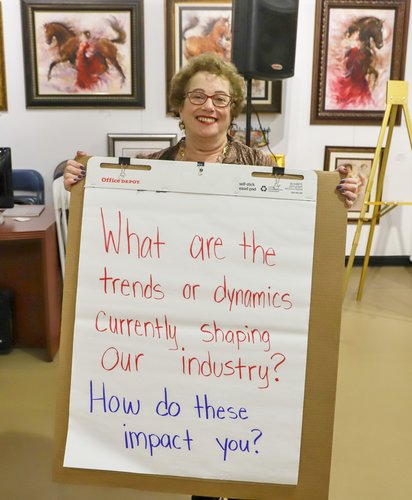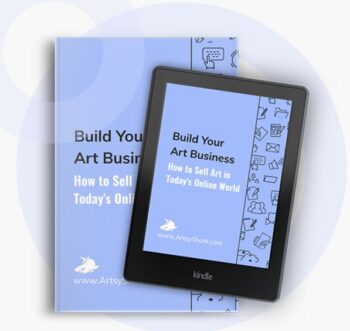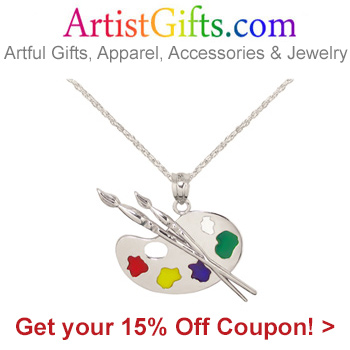by Carolyn Edlund
Arts advocate Rickie Leiter has worked tirelessly to provide support and resources for artists of all types. She offers her views on the current state of the industry, and what artists must know.

Rickie Leiter leads conversation at an arts industry networking event. Photo credit: Samantha Castro
AS: In your experience, what are the biggest challenges visual artists face today? Have they changed significantly in recent years?
RL: The biggest challenge visual artists face is deciding how and where to market their artwork. Because most artists have little or no business background, it is easy to fall into the “starving artist” syndrome, which is truly unnecessary. There are so many vetted resources that can guide them! Some major challenges they face are:
- Maintaining a business model (updated website, constant social media about their artistry, marketing, and advertising, expenses to apply to exhibits, insurance of their artwork, how to pay themselves)
- How to decide which gallery is the best fit for their artwork
- Pricing their work
- Maintaining an inventory
- Standing out in the crowd
- Understanding their niche market (if you try to be everything to everyone, you will burn out).
The proliferation of online art sales has become a reality. Brick and mortar galleries are folding under severe economic pressures to maintain the quality of art being offered, engaged art patrons, and continual sales.
Clients are eager to see the newest artwork available, which gives digital marketing an edge. Virtual galleries are being born constantly which eschew the normal expenses that physical galleries have. These expenses include electricity, water, property insurance, and insurance for the art, among others.
Even with virtual art marketing websites, artists must read the fine print of every contract! Does the artist maintain ownership of their images? How are sales tracked? How does an artist enter an art piece in another exhibit that just became available and fits their niche market?
In essence, artists have to ask themselves who their advocate will be. If they are relying on themselves, they must have reliable legal and financial advisors. It all boils down to a business plan. Creating is the “fun” part. You have to do the “hard” business part too, in order to be successful.
AS: With galleries in decline and the art market in transition, individual artists must become self-determining. How do you view this trend?
RL: Self-determination allows artists to network more freely, which I strongly believe is the ultimate marketing tool.
Artists need to do their homework, and move forward with a flexible but anchored plan. Go to a physical gallery and see if your work will fit in. See how the gallery staff responds to art lovers (not all of whom will be art patrons). Go to an opening reception and see who the clientele is. Do you see yourself there? Then, make an appointment to show your work; never just show up with a portfolio. If you are interested in a virtual gallery, contact some of the artists who use it, and ask for their feedback.
AS: What is your best advice for artists entering the market today? How can they get ahead?
RL: I am not a car mechanic. When my car needs servicing, I take it to a dealership whose reputation I trust. I am not a web designer. When I gave birth to The Rickie Report, I surrounded myself with a knowledgeable webmaster who speaks in plain language, a business manager, an accountant who set up our billing and payment systems, and a graphic designer. I still rely on these experts at different times.
Take a business class. Make a business plan. Have a business consult.
AS: What are your best tips for standing out from the crowd?
RL: I believe in dreaming big. And I dream “out of the box.” Here’s how to get started:
- Make a list of the people you know in your life (living anywhere).
- Share your passion (i.e. your artistry) with them.
- Follow my two-foot rule: share your passion with anyone who comes within two feet of you.
- Remember this is a moment for sharing, not selling.
- When people feel your passion, they are eager to share it.
- How can they help you? First you must tell other people about your work!
AS: Who else can an artist share their work with?
RL: Think about different, unexpected ways your artwork intersects with other people’s lives.
Are you a member of Costco? Send a link to your art website with a short note about how much you enjoy the Costco experience. You might be chosen for a highlight in their member’s magazine. This kind of publicity…. wow!
Are you exhibiting at a unique event? Contact AAA (Automobile Association of America) and ask about a virtual listing of your event, with a link to your website. They have lots of readers and give you lots of exposure, even if they can’t make the event.
Partner with a charity who invites their patrons to an event. When you sell your artwork, offer a portion of the sales to the charity. This is a win/win and the art patrons will feel good about it! Give out business cards that offer a percentage of the next sale to the charity as well. That brings repeat clients and helps you build a collector relationship.
Do you understand your market niche? I know an artist who creates hearts in her paintings. Who can she network with, knowing clients will be in tune with her artistry? Connections I suggest include the American Heart Association, medical practices of cardiologists, Valentine’s Day events, Red Dress events for women’s heart health, hospital gift shops, etc. I could go on and on with ideas, which is why I enjoy doing consults with artists.
AS: Your online newsletter The Rickie Report provides opportunities, publicity and updates for artists in the South Florida region. What other resources do you recommend to artists?
RL: Artsy Shark is one of the best resources I know. Besides websites which are specific to art exhibits and entry opportunities, I find some of my best kernels of creative ideas from business magazines. They may or may not be art related, but I read them and take notes. Here’s my top list:
- Your local Art in Public Places contact (search by county in Florida and other states)
- Juried Art Services
- Zapplication
- Call for Entry
- Festival Net
- Art Fair Insiders
- Art Festival
- Art Deadlines
- Online Juried Shows
- Artists Network
- The Art List
- Art Opportunities Monthly
Additionally, I recommend that artists refer to publications, especially Entrepreneur Magazine, Inc. Magazine, and Handmade Business, which often have great articles for artists and other creative business people. They can often be read free of charge at libraries.
Stay in touch with Rickie Leiter by subscribing to The Rickie Report, and following her on Facebook.


Speak Your Mind